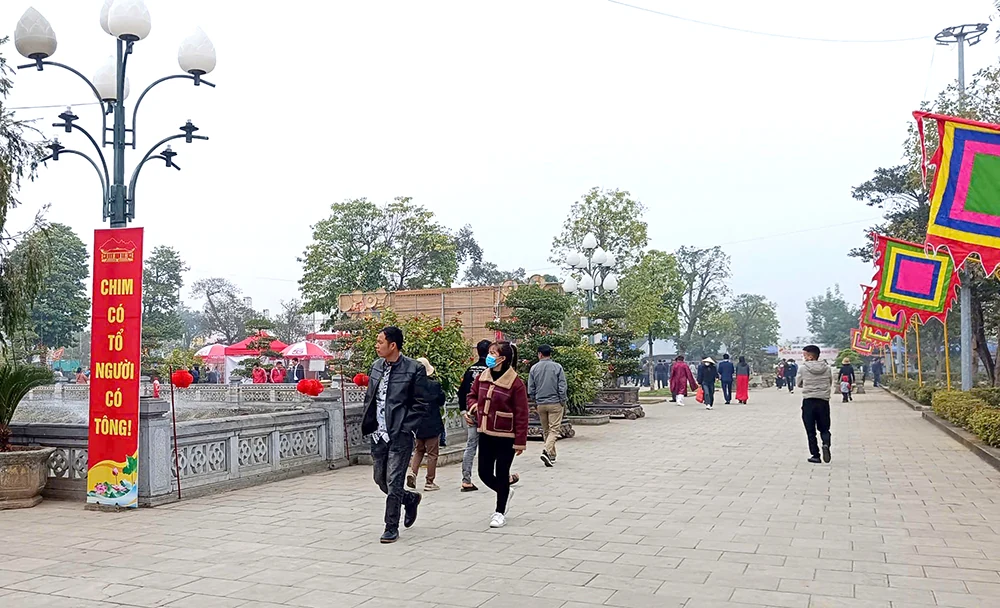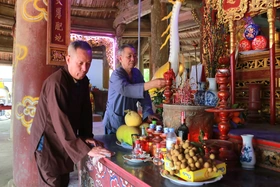{title}
{publish}
{head}
Phu Tho, the ancestral land of the Vietnamese people, is home to numerous historical relics, cultural sites rich in spiritual significance, and various festivals, both grand and intimate. Every Tet and spring season, it becomes a major tourist attraction, drawing large crowds of visitors. In recent years, authorities at all levels in Phu Tho have actively implemented various measures to enhance festival management, ensure environmental sanitation, and foster a dignified and well-organized festival atmosphere. These efforts not only help preserve and promote the value of historical and cultural sites but also attract both domestic and international tourists, thereby boosting socio-economic development.

The space of the Lang Suong Temple National Relic Site is kept clean and beautiful.
With more than 300 festivals, Phu Tho is one of the provinces with the highest number of festivals in Vietnam. Many festivals have been recognized as National Intangible Cultural Heritage. While they are held throughout the year, the majority take place between January and March on the lunar calendar. Every year, during the festival season, Phu Tho attracts hundreds of thousands of visitors who come to attend its vibrant celebrations. Alongside meticulous preparations for ceremonies and festivities, local authorities and communities have focused on beautifying the festival grounds, ensuring they remain green, clean, and visually appealing, leaving a positive impression on visitors.
In the early days of the new year, the Great Mother Au Co Temple Historical Relic Site (Hien Luong Commune, Ha Hoa District) welcomed thousands of visitors making a spiritual pilgrimage to honor Great Mother Au Co. The influx of visitors has placed additional strain on waste management and cleanliness efforts. To maintain cleanliness during the Great Mother Au Co Temple Festival, the Relic Site Management Board has advised the Ha Hoa District People’s Committee to formulate a plan with clearly assigned responsibilities.
To Thi Hai Yen, Head of the Management Board of the Great Mother Au Co Temple Historical Relic Site, shared, "At the start of the new spring, we witness a significant influx of visitors. Between the 5th and 7th days of the first lunar month, various rituals and festivities take place, including the worship ceremonies of the three Duc Ong and female officials, as well as the traditional contests of wrapping and cooking banh chung and pounding banh giay, drawing even larger crowds of devotees and tourists.
To maintain a clean and welcoming festival environment, the management board has installed additional trash bins throughout the site, deployed sanitation teams to key areas with heavy foot traffic, and instructed the waste collection department to increase manpower, vehicles, and collection frequency to prevent waste accumulation.
The Management Board has also launched public awareness initiatives and established agreements with service providers to uphold sanitation standards and prevent indiscriminate littering, ensuring a clean and dignified festival environment. At the same time, the Board reinforces public messages through loudspeaker announcements on environmental guidelines, encouraging visitors to take responsibility for proper waste disposal.
Overall, efforts to protect the environment and preserve scenic landscapes at early spring festivals in the province have seen significant improvements. Relic sites and scenic spots have been outfitted with sanitation facilities, including wastewater collection and treatment systems, enhancing both visual appeal and ecological sustainability.
Environmental protection at historical sites, particularly during festivals, has consistently been a priority for local authorities. These initiatives not only leave a lasting positive impression on visitors but also foster broader awareness of environmental preservation, encouraging responsible behavior among attendees.
Ms. Dao Thi Trang (Thanh Tri District, Hanoi), a visitor to the Lang Suong Temple Festival (Dong Trung Commune, Thanh Thuy District), shared, "Despite the high foot traffic at the festival, I have noticed that sanitation efforts are well maintained. In ritual areas and around food stalls, waste is efficiently collected and managed. Through awareness campaigns and public messaging, we have become more conscious of our responsibility when visiting relics and festival venues. This includes complying with hygiene and environmental protection regulations, disposing of waste properly, minimizing plastic waste, and maintaining public cleanliness.
Environmental protection at relic sites, especially during festivals, has consistently been a priority for local authorities. In preparation for Tet, district-level People’s Committees have directed agencies, unions, and social organizations to strictly enforce sanitation measures. They have also launched awareness campaigns to promote proper waste disposal, discourage littering, and prevent wastewater discharge in public spaces. Additionally, authorities have strengthened directives for environmental service units and festival organizers to ensure cleanliness is maintained before, during, and after the festivities.
Le Oanh

baophutho.vn On the morning of July 30, at Thuong Temple on Nghia Linh mountain within the Hung King Temple Historical Site, a delegation from the...

baophutho.vn Following the reorganization of commune-level administrative units, the Muong Vang region, formerly part of Lac Son district, was restructured...

baophutho.vn On the quiet Hill 79 in Hoa Binh Ward, nestled in the heart of the city along the Da River, lies a memory zone that quietly preserves the...

baophutho.vn The traditional art of creating skirt patterns among the Muong people, originally in Hoa Binh province, now part of Phu Tho province, has been...

baophutho.vn The Ministry of Culture, Sports, and Tourism has officially released the latest List of National Intangible Cultural Heritages, with the newly...

baophutho.vn The project to merge the three provinces of Phu Tho, Vinh Phuc, and Hoa Binh into a new Phu Tho province places high demands on solidarity and...

baophutho.vn With the desire not only to preserve the cultural space of the ancient Muong people but also to build a high-quality tourism destination rich...

baophutho.vn The Ministry of Culture, Sports and Tourism has officially recognized two traditional festivals in Phu Tho province as National Intangible...

baophutho.vn Phu Tho—the land of national origins—is home to more than 1,064 valuable historical and cultural relics. In recent years, efforts to enhance...

baophutho.vn For generations, ethnic minority communities in Thanh Son District have steadfastly preserved their traditional cultural values—woven deeply...

baophutho.vn In January, as spring arrives, the land and sky of Phu Tho bloom with new life, villages are adorned in fresh colors, and the people’s hearts...

baophutho.vn As spring arrives, village festivals across the Ancestral Land are in full swing. These spiritual and communal cultural activities express the...